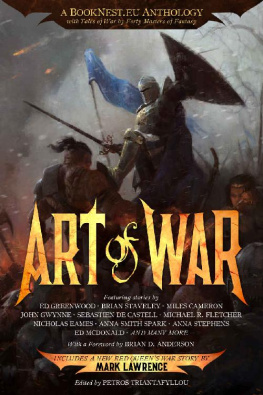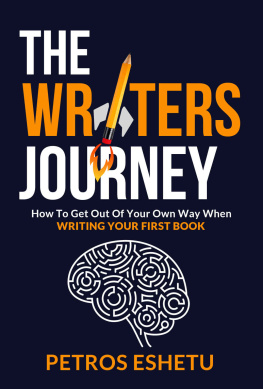Petros Triantafyllou (ed.) - Art of War: Anthology for Charity
Here you can read online Petros Triantafyllou (ed.) - Art of War: Anthology for Charity full text of the book (entire story) in english for free. Download pdf and epub, get meaning, cover and reviews about this ebook. year: 2018, genre: History. Description of the work, (preface) as well as reviews are available. Best literature library LitArk.com created for fans of good reading and offers a wide selection of genres:
Romance novel
Science fiction
Adventure
Detective
Science
History
Home and family
Prose
Art
Politics
Computer
Non-fiction
Religion
Business
Children
Humor
Choose a favorite category and find really read worthwhile books. Enjoy immersion in the world of imagination, feel the emotions of the characters or learn something new for yourself, make an fascinating discovery.
- Book:Art of War: Anthology for Charity
- Author:
- Genre:
- Year:2018
- Rating:3 / 5
- Favourites:Add to favourites
- Your mark:
- 60
- 1
- 2
- 3
- 4
- 5
Art of War: Anthology for Charity: summary, description and annotation
We offer to read an annotation, description, summary or preface (depends on what the author of the book "Art of War: Anthology for Charity" wrote himself). If you haven't found the necessary information about the book — write in the comments, we will try to find it.
Art of War: Anthology for Charity — read online for free the complete book (whole text) full work
Below is the text of the book, divided by pages. System saving the place of the last page read, allows you to conveniently read the book "Art of War: Anthology for Charity" online for free, without having to search again every time where you left off. Put a bookmark, and you can go to the page where you finished reading at any time.
Font size:
Interval:
Bookmark:
Art of War
Edited by Petros Triantafyllou
An Anthology for Charity:
All proceeds from Art of War will go to MSF (Doctors Without Borders)
2018
http://booknest.eu/
Cover art by John Antony di Giovanni
Cover design by Shawn T. King
Interior art by Jason Deem (Print version contains 40 B&W original art pieces.)
Editorial assistance by Tim Marquitz
Created in Greece
Worldwide Rights
All rights reserved. No part of this book may be reproduced, scanned, or distributed in any form, including digital, electronic, or mechanical, to include photocopying, recording, or by any information storage and retrieval system, without the prior written consent of the author, except for brief quotes used in reviews.
This book is a work of fiction. All characters, names, places, and incidents are products of the authors imagination or are used fictitiously. Any resemblance to any actual persons, living or dead, events or locales, is entirely coincidental.
Table of Contents
Foreword
I am tired and sick of war. Its glory is all moonshine. It is only those who have neither fired a shot nor heard the shrieks and groans of the wounded, who cry aloud for blood, for vengeance, for desolation. War is hell. - William Tecumseh Sherman
When I was asked to write this foreword, I was unsure how I should approach it. Or even if I were qualified to make the attempt. Many a great mind has written on this subject. From revered generals to spiritual leaders, war is a preoccupation of the human condition that has been explored in tremendous depth. Given this, I was more than a bit intimidated by the prospect of throwing my own two cents in. I am no general, nor a spiritual leader, and I have never considered myself among the great intellects of the world. But wars are not fought by great intellects. They are fought by soldiers. Men and women no different than myself. So rather than give in to self-doubt, I thought I would simply go talk to some soldiers. It felt like the right place to start.
I knew that my own perceptions of war had very little, if anything, to do with reality. After all, Ive never been a soldier; never been close to a war in any significant way. And yet most of my books depict massive battles, where good and evil collide to determine the fate of the world. I practically sing songs of its righteousness and virtue. I use the most sinister and violent aspects of our nature to paint a picture of valor, bravery, and kinship. Even though I know that war is among the most reprehensible acts perpetrated by humankind, I have yet to find a better way to illustrate who and what we are as a species. Even never having been near one, its horrors are as familiar as they are terrifying. I shudder at the thought of sending our young to their deaths and yet am utterly transfixed by tales of bloody conflict and heroism. I curse as fools those who claim war to be glorious or say that it is a necessary and unavoidable evil. And yet I cannot tear my eyes away from the images splayed across my television screen. The more I thought on this, the more I felt as if I were a true hypocrite, hating war yet unable to stop writing about it.
It wasnt until I went on one of my visits to the VFW that I understood, at least in a small way, what was behind my fascination, and why I was right to use war and its horrors to display laudable and even beautiful images of humanity. For those of you who do not know, VFW stands for Veterans of Foreign Wars. Though a private club, it welcomes the public to visit, vets and non-vets alike. Ive been going there for some time, favoring the company of older people with milder temperaments who are not prone to getting into bar brawls. When you walk through the door, its not much to look at. Just a bar, a pool room, and a small hall where they hold the occasional minor event (dances, karaoke, and whatnot). The casual observer would see little more than a bar full of crusty old men speaking to one another in slurred voices over mugs of cheap beer. But I assure you that it is much more than that. In a very real way, these crusty old men are what gives war its virtue, if any is to be found.
With a plan in mind, or at least a vague idea where I would start, I jumped in the car and headed off. They know me pretty well there and were more than happy to give a youngster such as myself the skinny on war and what it was all about. In truth, I think they were excited that someone else beside the other vets wanted to hear their stories. These men have been going to the VFW for years; long enough to have told every story they know a hundred times over. A fresh set of ears was obviously welcome.
So, after buying several rounds and listening attentively for hours, I discovered a common thread woven into each story. But it was not what I expected. It seemed that regardless of the war in which they fought, none of them spoke a single word about the fighting itself. Very little suggested they were speaking about their time in the service. Except for the mention of officers and technical terms only a soldier would use, they could have been telling me about their time at college or a trip with friends. I heard about bar brawls, loose women, pranks they played, the trouble they found themselves in, even being arrested. But the words enemy , firefight , bombs , and combat never came up. What did this have to do with war? I wondered. Maybe they would come to it eventually. But they didnt. After the first try, I went home quite discouraged. I still had the option of watching a documentary or two and then faking my way through it, as if I knew what the hell I was talking about. But I shoved this aside and marshaled my determination. I had resolved to give this my best, and I intended to do precisely that. Perhaps I was approaching this from the wrong angle. I hadnt wanted to lead them in a specific direction, thinking spontaneity would be better, more genuine. But I had either been wide of the mark or hadnt given them enough time to arrive at that point. After all, they had decades of tales to tell, and I had only given it one day.
On the second trip, I was still reluctant to lead them where I thought I needed them to go. Dont get me wrong; I was thoroughly entertained. The stories they told were interesting, deeply personal, and often side-splittingly hilarious. And with men ranging in age from 55-95, I could have spent weeks, possibly months, and still not heard them all. But I didnt have that long. My deadline was fast approaching. So finally, I was forced to press the issue.
Initially, I had assumed that they were avoiding telling me about the actual fighting because the memories were too painful. And in many cases this assumption was proven accurate. However, there were a few who seemed unbothered and were willing to describe their combat experiences. But the stories were unvaryingly bland and lacked any flavor or depth. The vets appeared disinterested, and sounded as if they were reading from a dry textbook. And oddly, they didnt understand why I would care about it in the first place. After all, everyone knew about the fighting. Only they knew what happened in the in-between moments, when the bloodshed ceased and the bombs stopped falling.
I had hoped to hear of strategy and heroism, the adrenaline-fueled rage of battle, where the average soldier finds courage he never knew he possessed. Instead, I was regaled with accounts of frivolity and almost juvenile mischief-making. What little I had heard of battle I could have read from any book on the subject. No closer to my objective, I went home, again on the verge of giving up. It had seemed like a good idea at the time to use veterans as a resource. But maybe I should just go with my other idea and watch some documentaries or read a few books by famous generals. But that didnt feel right either.
Next pageFont size:
Interval:
Bookmark:
Similar books «Art of War: Anthology for Charity»
Look at similar books to Art of War: Anthology for Charity. We have selected literature similar in name and meaning in the hope of providing readers with more options to find new, interesting, not yet read works.
Discussion, reviews of the book Art of War: Anthology for Charity and just readers' own opinions. Leave your comments, write what you think about the work, its meaning or the main characters. Specify what exactly you liked and what you didn't like, and why you think so.











